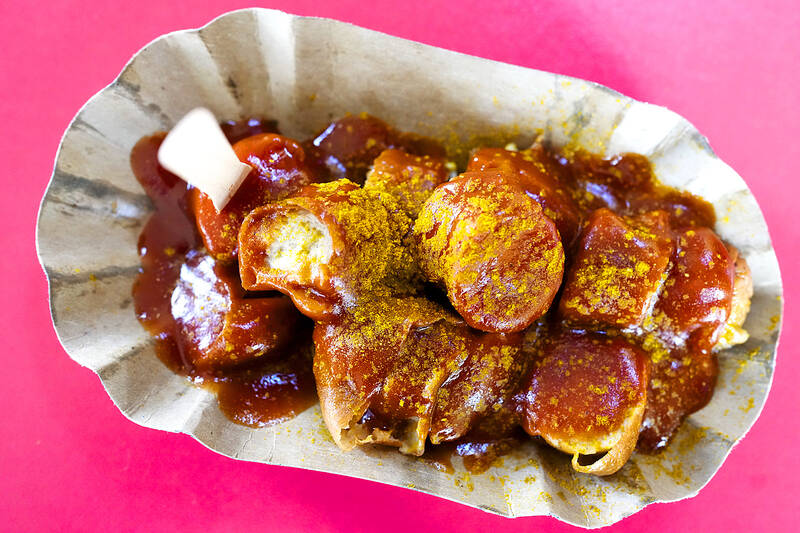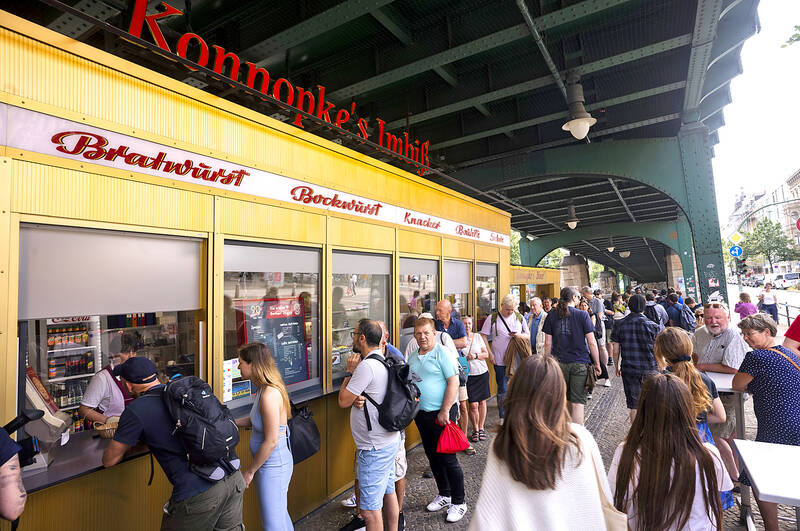Bite-sized bliss. The currywurst is considered a fast-food delicacy in Germany, and the perfect treat before a game.
The Union of European Football Associations (UEFA) said that soccer supporters from across Europe would find this savory German invention on offer at stadiums throughout the country during UEFA Euro 2024, which started on Friday.
The pork sausage garnished with curry sauce is usually presented on a pristine white cardboard platter with a two-pronged plastic fork. It can be served with skin or without — visiting supporters would likely develop their own preference by the end of the month-long tournament.

Photo: AP
While its origins are contested, the currywurst has a special place in the food culture of Berlin.
“Our city is all about currywurst, and I think our city can’t live without currywurst. Whoever comes to Berlin has to try currywurst to know what the city’s about,” said Linda Konnopke, who helps run her family’s popular fast-food joint in the German capital’s Prenzlauer Berg district.
Her great-grandparents Max and Charlotte Konnopke first began selling sausages from their portable grill in 1930, and the family-run business has since become an institution famous for its currywurst, which Gunter Konnopke, their son, introduced to East Berlin in 1960. It was an immediate hit. The recipe is still a closely guarded family secret.

Photo: AP
“Our absolute highlight is our currywurst without skin. That’s our biggest seller,” Linda Konnopke said.
The currywurst is usually sliced into convenient bite-sized portions. It can be doused in ketchup and sprinkled with curry powder, but some vendors — such as Konnopke’s — use their own specific curry sauce.
A woman named Herta Heuwer is largely credited with its invention. Heuwer was one of thousands of Berlin’s “Trummerfrauen” (rubble women), who helped clear the wreckage left after World War II, and afterward she ran her own fast-food business in the borough of Charlottenburg in the west of the city.
Some say Heuwer was bored one day and decided to experiment with the ingredients she had; others that she ran out of mustard and needed an alternative. Either way, she claimed to have invented the currywurst on Sept. 4, 1949.
Berlin proclaimed itself the “currywurst capital” on a plaque honoring Heuwer where she sold her first currywurst, but there are rival claims from Hamburg and the Ruhr area in western Germany.
At the DFB-Pokal soccer final in Berlin last month, Kaiserslautern supporter Luisa Albert said she prefers the currywurst in Kaiserslautern, which is in the state of Rhineland-Palatinate.
As stadium food, it is always a winner, she said.
“Currywurst is the best thing you can eat before a game,” she said. “It gives you the strength to cheer and celebrate and do everything.”
Supporters attending games at Berlin’s Olympiastadion wold be able to get their currywurst from Hertha BSC supporter Ollie Brandt, who has been offering fast-food outside the stadium for more than 40 years.
Brandt takes great pride in offering currywurst sausages manufactured to another longstanding family recipe, but he does not think much of currywurst from outside the capital.
“If you go to the Rhineland, for example, you get a grilled sausage that’s smeared with a sort of curry sauce sold as a currywurst, but that’s no currywurst,” Brandt said as he held up a package of his own sausages. “This here is a real currywurst.”
Brandt said fans would simply have to try the different types and styles to determine their favorite.
“We have I don’t know how many thousands of snack bars all over Berlin, East and West. Everyone does it differently. It doesn’t taste the same anywhere, but it’s still simply unique,” Brandt said. “You have to try it.”

NO BREAKTHROUGH? More substantial ‘deliverables,’ such as tariff reductions, would likely be saved for a meeting between Trump and Xi later this year, a trade expert said China launched two probes targeting the US semiconductor sector on Saturday ahead of talks between the two nations in Spain this week on trade, national security and the ownership of social media platform TikTok. China’s Ministry of Commerce announced an anti-dumping investigation into certain analog integrated circuits (ICs) imported from the US. The investigation is to target some commodity interface ICs and gate driver ICs, which are commonly made by US companies such as Texas Instruments Inc and ON Semiconductor Corp. The ministry also announced an anti-discrimination probe into US measures against China’s chip sector. US measures such as export curbs and tariffs

The US on Friday penalized two Chinese firms that acquired US chipmaking equipment for China’s top chipmaker, Semiconductor Manufacturing International Corp (SMIC, 中芯國際), including them among 32 entities that were added to the US Department of Commerce’s restricted trade list, a US government posting showed. Twenty-three of the 32 are in China. GMC Semiconductor Technology (Wuxi) Co (吉姆西半導體科技) and Jicun Semiconductor Technology (Shanghai) Co (吉存半導體科技) were placed on the list, formally known as the Entity List, for acquiring equipment for SMIC Northern Integrated Circuit Manufacturing (Beijing) Corp (中芯北方積體電路) and Semiconductor Manufacturing International (Beijing) Corp (中芯北京), the US Federal Register posting said. The

READY TO HELP: Should TSMC require assistance, the government would fully cooperate in helping to speed up the establishment of the Chiayi plant, an official said Taiwan Semiconductor Manufacturing Co (TSMC, 台積電) yesterday said its investment plans in Taiwan are “unchanged” amid speculation that the chipmaker might have suspended construction work on its second chip packaging plant in Chiayi County and plans to move equipment arranged for the plant to the US. The Chinese-language Economic Daily News reported earlier yesterday that TSMC had halted the construction of the chip packaging plant, which was scheduled to be completed next year and begin mass production in 2028. TSMC did not directly address whether construction of the plant had halted, but said its investment plans in Taiwan remain “unchanged.” The chipmaker started

MORTGAGE WORRIES: About 34% of respondents to a survey said they would approach multiple lenders to pay for a home, while 29.2% said they would ask family for help New housing projects in Taiwan’s six special municipalities, as well as Hsinchu city and county, are projected to total NT$710.65 billion (US$23.61 billion) in the upcoming fall sales season, a record 30 percent decrease from a year earlier, as tighter mortgage rules prompt developers to pull back, property listing platform 591.com (591新建案) said yesterday. The number of projects has also fallen to 312, a more than 20 percent decrease year-on-year, underscoring weakening sentiment and momentum amid lingering policy and financing headwinds. New Taipei City and Taoyuan bucked the downturn in project value, while Taipei, Hsinchu city and county, Taichung, Tainan and Kaohsiung